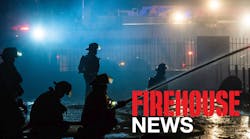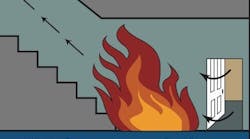The first session was bitterly bipartisan, with very little accomplished as Democrats, Republicans and the White House engaged in open warfare on every major issue. They barely managed to pass a budget for the 2000 fiscal year which, to no one's surprise, included $900 million for President Clinton's program to hire 50,000 additional "community oriented" police officers. (The President complained that it wasn't enough!) Don't even ask what the fire-rescue service got to hire more firefighters; the answer is nothing.
Since 2000 is an election year, it's unlikely there will be any improvement and, if anything, Congress will be even more undisciplined and partisan. The Democrats see an opportunity to regain control of the House and possibly the Senate in next November's election; the Republicans are equally determined to prevent that from happening. And, both want to elect a new president from their party. It means they will find very little to agree on and each side will be seeking to gain an edge on every issue. In that highly charged political atmosphere, "compromise" and "bipartisan" become dirty words.
Nevertheless, the fire service has to continue fighting for legislation it needs and be constantly alert to oppose any measure that threatens the safety and welfare of firefighters. Here are a few of the important bills that are pending in various congressional committees.
Word is out that the agricultural-business interests are coming back with an amendment to the Hazardous Materials Reauthorization Act that would exempt their trucks from carrying a warning placard and shipping manifest while transporting certain chemical products within a state. A unified effort by the fire organizations defeated them in the 105th Congress, but they'll never stop trying to save the $12 cost of a hazmat placard and avoid the so-called "red tape" of a piece of paper that lists the dangerous cargo they're hauling.
Agriculture is a powerful interest group on Capital Hill and the 2000 budget provides $8.7 billion in emergency aid to farmers, including $1.2 billion for natural disaster relief. In contrast, the Volunteer Fire Assistance Program - which is aimed at helping the small rural fire departments that protect farm regions - is struggling to get federal money that's needed for training, equipment and protective clothing. The appropriation was raised from $2 million a year to $3.25 million, but the Clinton administration wants to cut it back to $2.7 million. The National Volunteer Fire Council (NVFC) is asking for $10 million in the 2001 budget, pointing out that requests from fire departments who desperately need help amount to $24 million every year.
Apparently, it's OK to spend billions on disaster relief, but only pennies to train and equip the firefighters who are responsible for saving lives and property when disaster strikes a rural area. Can anyone explain the logic in this?
Agri-business interests aren't the only ones trying to escape the burden of red tape. Small businessmen want an exemption to the Small Business Paper Work Reduction Act that would grant them a free pass, without penalty, the first time they get caught for failing to file a required federal form. The International Association of Fire Chiefs (IAFC) is concerned that among the forms they would not file is the listing of hazardous materials in their buildings. It's called a "get-out-of-jail" card for first offenders, but it also endangers the lives of firefighters responding to a fire or hazmat incident.
A bill that did draw up some bipartisan support when introduced in the first session of this congress is the Public Safety Employer-Employee Cooperation Act of 1999. It's a top priority for the International Association of Fire Fighters (IAFF) and is aimed at providing a form of collective bargaining in the 18 states where firefighters do not have that right. It would allow them to discuss health, safety, and wage-and-work rules with local government officials.
Opposition is coming from conservative groups who see it as a threat to state right-to-work laws. Opponents also charge that it would lead to strikes and binding arbitration in labor disputes, even though the bill specifically prohibits strikes and binding arbitration.
This is only a small sample of fire-rescue legislation that is pending in Congress; there are dozens of bills scattered among the many congressional committees, all waiting for hearings. Most will simply die in committee; only a handful will make it out to the House and Senate floors for a yes or no vote.
That could be the fate of the FIRE Act as Congress returns. The holiday recess was seen as an opportunity to drum up grass-roots support for the bill, which calls for $5 billion in federal grants to local fire departments over a period of five years. It has been buried in the House Science subcommittee on Basic Research and the crucial question is how many Republicans - especially the GOP leaders who control Congress - will come back to Washington with a changed attitude about the FIRE Act. Hopefully, they've gotten an earful from their local chiefs and firefighters on how badly the money is needed and will now reverse direction and give the bill a fair hearing.
A meeting of the Fire Service Leadership Summit, sponsored by the IAFC, was held near Washington's Dulles Airport just before the holidays. Representatives of almost every fire organization attended and agreed to intensify their efforts in support of the bill. Two versions have been introduced in the Senate, but the major obstacle at this point is the House Science committee and its refusal to hold a hearing.
Maybe it would help if the White House and Republican leaders could be convinced that firefighters also are "community oriented" - just like the cops.
Hal Bruno, a Firehouse® contributing editor, is a retired political director for ABC News in Washington and served for 40 years as a volunteer firefighter.




